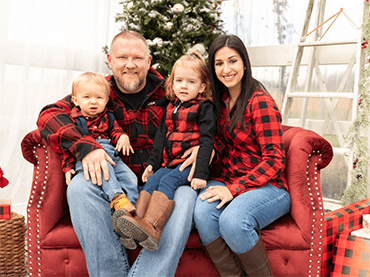When the headaches started in late July 2023, Mark Dye, 47, chalked it up to stress. A small business owner and busy father of two young children, he also was preparing for a new year as a fifth-grade math and science teacher at Southmoreland Elementary School.
But over the next two months, Mark started having sudden and severe thunderclap headaches. By November, the debilitating headaches were occurring several times a day along with vertigo. Any kind of strain — bending over, picking up his children, even sneezing — triggered pain and dizziness. His breathing became labored.
“I knew something was terribly wrong,” says Mark, a Mount Pleasant, Pa., resident. “I was afraid to sneeze or go to the bathroom. I thought I was going to have a stroke or an aneurysm.”
The Challenge: A Large Mass
At first, Mark’s primary care doctor prescribed migraine medicine. But it didn’t help. Bloodwork and tests for Lyme disease and pulmonary function were all normal. Alarmed by his worsening symptoms, Mark insisted on an MRI, which was finally scheduled for Dec. 27.
“That’s when I found out I had a large mass in the back of my brain,” says Mark.
The following day, a more detailed MRI with contrast revealed a 1 cm brain tumor with a large, walnut-size cyst in his cerebellum, the area of the brain that controls movement and balance. Surgery was needed to remove the dangerous mass.
The Path to UPMC
Luckily for Mark, he is good friends with Albert Saloom, MD, an emergency medicine doctor at UPMC Somerset. When Mark shared the news of his diagnosis, Dr. Saloom quickly reached out to his colleague Richard Wadas, MD, an emergency medicine doctor at UPMC Presbyterian.
With Mark’s permission, they shared his images and records with neurosurgeon Walter E. Dandy Distinguished Professor and chair of the University of Pittsburgh Department of Neurological Surgery.
On Dec. 29 — just two days after first learning he had mass in his brain — Mark and his wife, Cassie, were on a video call with the neurosurgeon, who was in Idaho with his family for the holidays.
The neurosurgeon explained that Mark had a hemangioblastoma — a rare, benign, and highly vascular brain tumor. The tumor, which was located deep in the cerebellum, needed to be removed before the mass caused catastrophic damage. Mark would be scheduled for the first surgery of the day on Jan. 2, 2024.
The Solution
Mark was admitted to UPMC Presbyterian on Jan. 1. The next morning, the neurosurgeon met with him before the surgery.
“I was very nervous, but seeing the neurosurgeon put me at ease,” says Mark. “I had great confidence in him. I couldn’t ask for anyone better.”
During surgery, the neurosurgeon performed a subtemporal craniotomy, which involves removing part of the skull to access the brain. The goal was to remove the tumor and cyst and relieve pressure while preserving surrounding healthy brain tissue.
The surgery lasted less than five hours. Mark was soon asking to see his wife. He even talked to his 3-year-old on the phone.
“I was groggy, but I was sitting up and joking around,” says Mark. “That was reassuring. My sense of humor is what makes me — me.”
The Results
To Mark’s relief, the headaches disappeared after the surgery.
“I could tell right away that the surgery worked,” he says. “I could cough or sneeze without a thunderclap headache.”
The Dyes had been prepared for Mark to spend at least a week in the hospital and a few weeks in a rehabilitation facility as he regained mobility. But he was up and walking that evening after his surgery. Two days later, Mark was back home with his family.
At his follow-up appointment two weeks later, Cassie asked the neurosurgeon if she could give him a hug.
“I cried and I thanked him for saving my husband’s life,” says Cassie. “We were so fortunate he was in the care of a world-class neurosurgeon.”
Seven weeks after his surgery, Mark says he’s getting stronger every day. Although he has some lingering short-term memory loss, he’s improving steadily. He hopes he’ll soon be allowed to roughhouse with and carry his children again. And he looks forward to returning to the classroom next fall.
“The care I received at UPMC Presbyterian was absolutely wonderful,” says Mark. “And the neurosurgeon saved my life. He gave me the opportunity to be with my family and hold my kids again. A simple thank you isn’t enough. I will be forever grateful.”

















